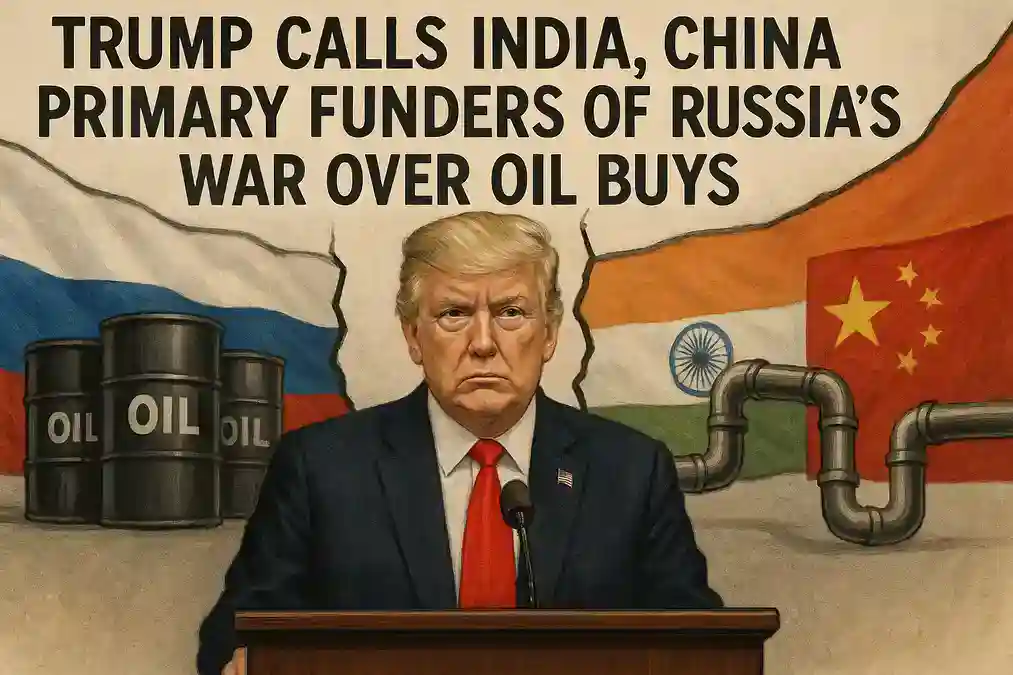Trump Labels India and China as Primary Funders of Russia’s War. Former U.S. President Donald Trump has once again made headlines, this time by linking India and China directly to Russia’s war in Ukraine. According to him, the two Asian giants are the “primary funders” of Moscow’s military campaign because of their continued purchases of Russian oil.
The statement has triggered sharp reactions across global capitals and set off fresh debate on the uneasy balance between energy security and moral responsibility during times of war.
A Direct Accusation
Trump’s words were blunt. He argued that every barrel of Russian oil bought by India or China translates into financial support for the Kremlin’s offensive in Ukraine. In his view, oil revenue is no different from war funding.
This was one of his most pointed criticisms of both New Delhi and Beijing in recent months. The timing was also important – it came as the U.S. continues to push its allies to tighten sanctions and cut economic ties with Moscow.
Oil Revenues in Focus
Since Western nations cut back on Russian crude imports, Moscow has turned east. India and China quickly stepped in, buying heavily discounted oil. Both countries now rank as Russia’s top buyers.
Trump’s claim rests on this trade shift. By purchasing Russian crude, he says, India and China have effectively given Moscow a financial lifeline. The former president framed it as a matter of cause and effect: oil sales fund war, and buyers share the responsibility.
Tariffs and Tensions
Trump defended the 25 percent tariff the U.S. has placed on certain Indian goods. He argued that such penalties are needed to push New Delhi away from Russian oil.
Critics, however, see this as risky. Punitive tariffs, they warn, could backfire by driving India closer to Moscow and Beijing at a time when Washington needs New Delhi as a partner in Asia.
India Pushes Back
India has strongly rejected Trump’s charge. Officials in New Delhi have called the U.S. tariffs “unjustified and unreasonable.”
India insists that its energy decisions are driven by necessity, not politics. With a booming economy and millions relying on affordable fuel, discounted Russian oil is seen as vital for domestic stability.
For Indian leaders, Trump’s framing ignores the complexity of global trade. Energy security, they argue, cannot be reduced to a moral equation set in Washington.
China’s Quiet Approach
While India has spoken out, Beijing has remained silent. China continues to buy large amounts of Russian oil but has avoided direct confrontation with Washington over Trump’s remarks.
Analysts believe this is deliberate. China prefers to stay quiet, let India take the heat, and continue its energy strategy without drawing extra attention.
Trade vs. Ethics
Trump’s comments have revived the larger question: Should countries prioritize cheap energy or global responsibility during wartime?
For the U.S. and Europe, the answer is clear – buying Russian oil means funding the war. For India and China, the issue looks different. Their leaders see energy supply and price stability as immediate survival needs for their people.
This clash of perspectives shows how national interest and global morality often collide.
Also Read:- Trump’s $100K H-1B Fee Hits Indians Who Hold 70% of Visas
Diplomatic Strain
By calling India and China “primary funders,” Trump has placed U.S. diplomacy in a tough spot.
India is seen as a key ally in balancing China’s influence in the Indo-Pacific. Openly accusing it of funding Russia risks undermining years of partnership-building.
In China’s case, the remarks add another layer of tension to an already strained relationship with Washington.
Energy Security vs. Moral Duty
The heart of the matter is a difficult question: should countries take an economic hit to uphold global sanctions, or should they focus on affordable energy for their own people?
For Washington, the moral duty comes first. For India and China, the reality of energy demand makes such choices far more complicated.
Sanctions Back in Spotlight
Trump’s words may push Western nations to tighten sanctions enforcement. That could include tracking financial flows more closely, imposing secondary sanctions on third-party states, or ramping up diplomatic pressure on buyers of Russian crude.
Many countries in Asia, Africa, and the Middle East are watching carefully. They face the same dilemma as India: cheap oil versus political alignment with the West.
What Comes Next?
The road ahead is uncertain. Will India bow to pressure and reduce its Russian imports, or will it double down on its position of strategic independence? Will China remain silent, or eventually defend its choices more openly? And how far will the U.S. go in pushing its allies to comply?
One thing is clear: Trump’s remarks have once again turned energy into more than a commodity. Oil has become a symbol of power, politics, and survival in a world divided by war.

